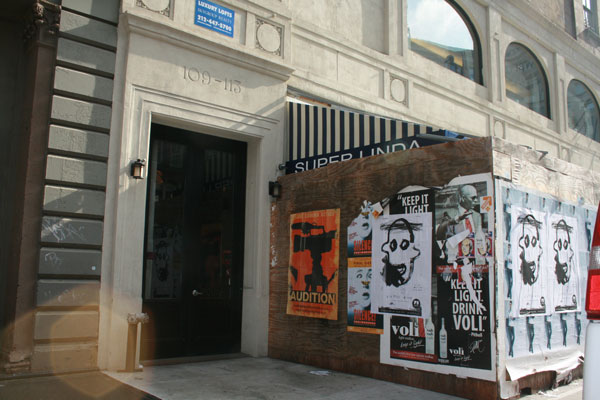 [/media-credit]
[/media-credit]
Some members of Community Board 1’s Tribeca Committee are excited about the new restaurant, “Super Linda,” which will be moving into the ground-floor space at 109 West Broadway. The space has been vacant since 2006 when Delphi restaurant closed after a 37-year-long stretch.
“I personally think it’s not beneficial to our neighborhood at all to have the place sitting empty for two or three years — especially on West Broadway, our main commercial thoroughfare,” said Committee Co-Chair Peter Braus.
While Braus and the committee at large supported Abramcyk’s application for an enclosed sidewalk café in a resolution, other nearby residents are worried about rowdy diners and loud background music. Their fears were heightened when they learned that Abramcyk received numerous noise complaints last year from his bar-eatery on Warren Street, Warren 77.
While the committee endorsed the application, the resolution includes a whereas clause, stating, “Neighbors expressed concerns with potential noise emanating from music through [Super Linda’s] open windows, and the applicant agreed to monitor noise levels and to take the appropriate steps to ameliorate any disturbances reported by residents.”
Abramcyk, who presented his proposal at the committee’s Oct. 12 meeting, tried to reassure the committee that Super Linda will cater to a quieter clientele and have a different ambiance than Warren 77, which is branded as a bustling sports bar.
“I’m going to do my best to make your life good… as long as I don’t have to close my business down,” said Abramcyk. “If the windows are open and the sound is bothering you, hopefully we can just close them. But I don’t want to handicap myself doing it [from the start] when I don’t need to.”
Abramcyk said he has demonstrated his ability to accommodate neighbors’ concerns last year by spending nearly ten thousand dollars to soundproof Warren 77 after a series of noise complaints from area residents.
Some local residents were unconvinced by Abramcyk’s promises — such as committee member Jeff Ehrlich. Though he voted to support the resolution, Ehrlich thought twice about his decision afterward — particularly since the resolution placed no restriction on Abramcyk’s ability to keep Super Linda’s windows open throughout the evenings. Ehrlich is also nervous about the restaurant’s main entrance being on Reade Street, which is known to be a calm residential sidestreet.
Ehrlich said he wants to preserve consistency and accountability with respect to new neighborhood businesses such as Super Linda.
“In general what we do with these places is, we let them try something out for six-months-to-a-year and give [the restaurant] earlier hours until we find out how it does,” said Ehrlich. “In this case, there’s no real precedent — [Abramcyk] is saying that if there are problems, he’ll close the windows. That puts a lot of responsibility on the residents.”
Karen Stamm, a public member of C.B. 1 who lives on the corner of Broadway and Franklin Street, voted against the resolution, fearing that the board’s lenience toward Abramcyk would set a bad example for future area businesses.
The committee, Stamm believes, could have taken more caution when reviewing Abramcyk’s application by placing certain limitations on the restaurant, such as an earlier closing time or window-closing rules.
“If there are no issues, we could remove or change the restriction,” said Stamm, “but I think we should make a point of being consistent, and I think we should not put the burden on neighbors to complain before we take action.”
Other committee members defended Abramcyk, including Braus, who believes that, given his history of heeding local residents’ concerns, the restaurateur should be given the benefit of the doubt in this circumstance.
“I think Matt has been one of the most cooperative people that I’ve ever dealt with in terms of being responsive to complaints, and I think someone who has established credibility with the community board warrants some latitude,” said Braus. “He exemplifies the type of operator that we want in the neighborhood, and I don’t think we have any reason to think that, if there are problems, that he won’t address them.”
The extension of the seating area into the street will help diffuse and mitigate the sound, Braus and others said.

































